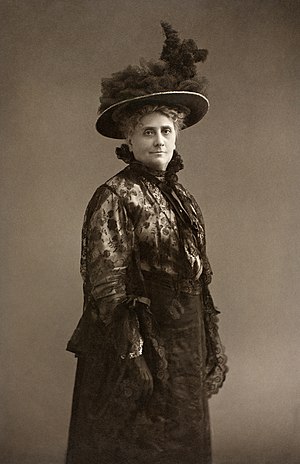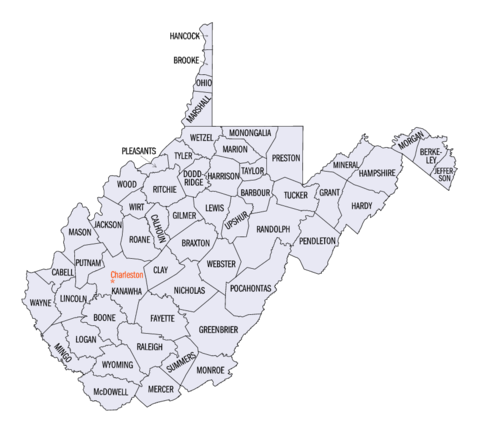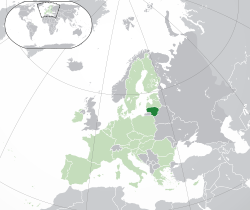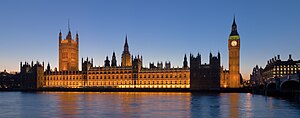Portal:Politics
| Main | Topics and categories | Tasks and projects |
The Politics portal
Politics (from Ancient Greek πολιτικά (politiká) 'affairs of the cities') is the set of activities that are associated with making decisions in groups, or other forms of power relations among individuals, such as the distribution of resources or status. The branch of social science that studies politics and government is referred to as political science.
It may be used positively in the context of a "political solution" which is compromising and non-violent, or descriptively as "the art or science of government", but also often carries a negative connotation. The concept has been defined in various ways, and different approaches have fundamentally differing views on whether it should be used extensively or in a limited way, empirically or normatively, and on whether conflict or co-operation is more essential to it.
A variety of methods are deployed in politics, which include promoting one's own political views among people, negotiation with other political subjects, making laws, and exercising internal and external force, including warfare against adversaries. Politics is exercised on a wide range of social levels, from clans and tribes of traditional societies, through modern local governments, companies and institutions up to sovereign states, to the international level.
In modern nation states, people often form political parties to represent their ideas. Members of a party often agree to take the same position on many issues and agree to support the same changes to law and the same leaders. An election is usually a competition between different parties.
A political system is a framework which defines acceptable political methods within a society. The history of political thought can be traced back to early antiquity, with seminal works such as Plato's Republic, Aristotle's Politics, Confucius's political manuscripts and Chanakya's Arthashastra. (Full article...)
Selected article
The Oregon State Capitol is the building housing the state legislature and the offices of the governor, secretary of state, and treasurer of the U.S. state of Oregon. It is located in the state capital, Salem. The current building, constructed in 1935 and expanded in 1977, is the third to house the Oregon state government since the state administration moved to Salem in 1852. Two former capitol buildings were destroyed by fire, one in 1855 and the other in 1935. New York architects Trowbridge & Livingston conceived the current structure's Art Deco design, in association with Francis Keally. Much of the interior and exterior are made of marble. The Oregon State Capitol was placed on the National Register of Historic Places in 1988. The Public Works Administration, part of the U.S. government, partially financed construction, which was completed during the Great Depression, in 1937. The building was erected at a cost of $2.5 million for the central portion of the building, which includes a dome of 166 feet (51 m).
Featured picture

Gina Krog (20 June 1847 – 14 April 1916) was a Norwegian suffragist, teacher, liberal politician, writer and editor. She played a central role in the Norwegian women's movement from the 1880s until her death, notably as a leading campaigner for women's right to vote. In 1884, Krog co-founded the Norwegian Association for Women's Rights with liberal MP Hagbart Berner. Over the next two decades, Krog co-founded the Women's Voting Association, the National Association for Women's Suffrage, and the Norwegian National Women's Council, spearheading the presentation of women's suffrage proposals to the Storting (the Norwegian parliament). She was an early member of the Liberal Party and served as a deputy member of its national board.
Selected quote
Selected biography
Samuel Adams (1722–1803) was an American statesman, politician, writer and political philosopher who was one of the Founding Fathers of the United States. Adams was instrumental in garnering the support of the colonies in rebellion against Great Britain, ultimately resulting in the American Revolution. He was also one of the key architects of the principles of American republicanism that shaped American political culture. Adams organized protests against the British, including the Boston Tea Party in 1773, and participated in the Continental Congress. He also advocated for the adoption of the Declaration of Independence at the Second Continental Congress. Following the American Revolution, Adams helped draft the Articles of Confederation. After the war ended, he ran for the House of Representatives in the 1st United States Congressional election, but was unsuccessful in his bid. He was elected Lieutenant Governor of Massachusetts in 1789 and after John Hancock's death in 1793, Adams served as the acting governor, until he was elected governor in January of the following year. He served in that position until June 1797 when he decided to retire from politics.
Did you know (auto-generated) -

- ... that a Chinese corruption investigation into Gao Yan has been interpreted as a political move against Li Peng, then second-in-command of the Communist Party of China?
- ... that nearing the end of his tenure as mayor of Tegal, Indonesia, Adi Winarso took part in a talkshow with his former political competitors?
- ... that the Democratic Society Party was the 25th political party to be banned in Turkey since 1962?
- ... that prior to entering politics, Herbert Salvatierra led a troupe of carnival comparsas?
- ... that Ambati Rambabu, the state minister for irrigation of Andhra Pradesh, dabbled in acting before entering politics?
- ... that Marisa Anderson organized and participated in multiple cross-country walks to raise awareness for various political causes?
More did you know...
- ...that a logocracy is government through words?
- ...that the Jewish Socialist Workers Party in the Russian Empire mobilized 3,000 of its cadres in self-defense militias during 1906?
- ...that the liberal film company Brave New Films has produced full-length videos and paper advertisements in addition to the viral videos for which it is known?
- ...that the 1968 pamphlet Is the School House the Proper Place to Teach Raw Sex? claimed that sex education was a Communist conspiracy?
- ...that the American Society of Magazine Editors book The Best American Magazine Writing 2007 features investigative journalism about the Beslan school hostage crisis and survivors of Agent Orange?
- ...that the Libyan opposition has embraced "Zenga Zenga", an Israeli-created auto-tuned song and viral YouTube video that parodies Libyan ruler Muammar Gaddafi (pictured)?
- ...that co-founder of the Saudi Civil and Political Rights Association Mohammed al-Bejadi spent most of 2011 in prison?
- ...that on the death of Governor George Madison, Kentucky lieutenant governor Gabriel Slaughter was refused the title of "governor" by a hostile state legislature and was referred to as "acting governor" for the duration of his three-year administration?
In this month
- May 5, 2005 – A General Election in the United Kingdom sees Tony Blair's Labour government returned to office with a reduced majority of 66.
- May 14, 1948 – The Declaration of Independence of Israel is made.
- May 18, 1948 – The first Legislative Yuan of the Republic of China officially convenes in Nanking.
News and Current events
- August 11: 4 local government areas in New South Wales, Australia locked down after COVID-19 case
- August 11: Australia: AstraZeneca vaccine access expanded by Victorian government
- August 1: Australia: Victorian lockdown lifted
- July 29: Tunisia's president dismisses prime minister, suspends parliament
- July 25: Australia: Wikinews interviews Reg Kidd, mayor of the City of Orange, about COVID-19 lockdown and local government
- July 23: South Australia enters week-long lockdown to contain COVID-19 Delta variant spread
- July 21: Technological University Dublin senior lecturer Dr Lorcan Sirr speaks to Wikinews on housing market in Ireland
- July 21: Three rural councils in New South Wales, Australia enter 7-day lockdown
- July 21: Australia: Victoria lockdown extended by a week with 85 active cases recorded
- July 15: California governor signs new state budget, eligible Californians to get stimulus payments
Topics and categories
General images
Related portals
Associated Wikimedia
The following Wikimedia Foundation sister projects provide more on this subject:
-
Commons
Free media repository -
Wikibooks
Free textbooks and manuals -
Wikidata
Free knowledge base -
Wikinews
Free-content news -
Wikiquote
Collection of quotations -
Wikisource
Free-content library -
Wikiversity
Free learning tools -
Wiktionary
Dictionary and thesaurus



























































